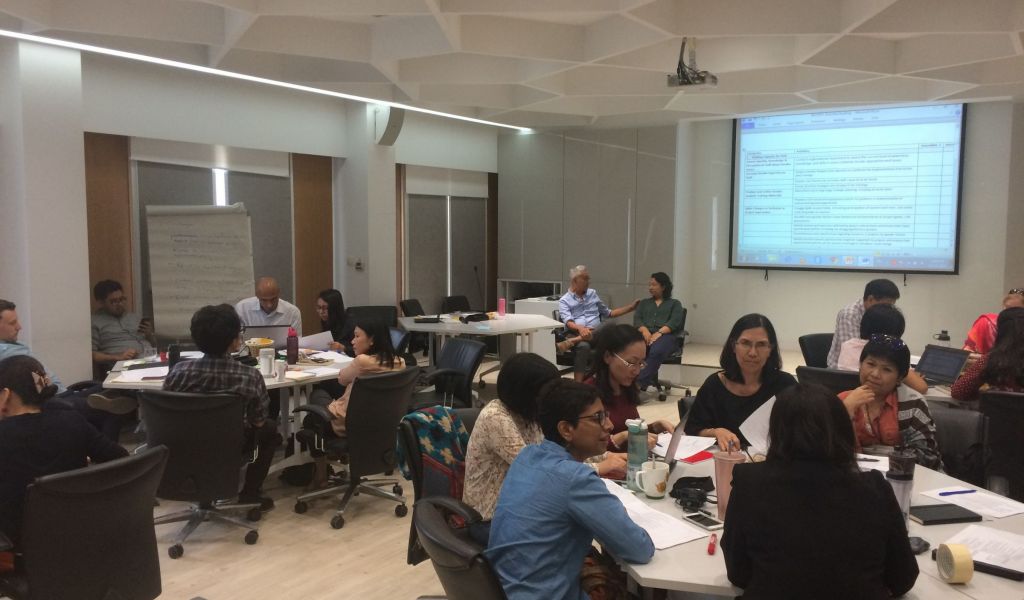The Future is Now: our drive to secure gender equality across forest landscapes

The inclusion of such mandates on gender equality signals an increasing awareness and acknowledgment that we as the development community need to address gender inequality. Recent approaches call for the need to address the issue through innovative mechanisms of engagement, finance modalities, and public-private partnerships; however, these efforts will fall short if the rhetoric on gender equality is not made actionable in practice. There is thus a need to demonstrate how the common nexus between gender equality and climate change can be implemented in a fashion that delivers tangible results. Organizations that are at the forefront of translating policy to practice through tailored and targeted capacity approaches need to take progressive steps to make gender equality even more actionable.
Recognizing this, RECOFTC - The Center for People and Forest is making multiple efforts to strengthen gender equality in forestry landscapes through strategic interventions across its projects, programs, and institutional policies. To start with, RECOFTC initiated an assessment to take stock of its 30 years of operational experience of addressing gender equity and other social inclusion issues in the context of community forest landscapes in the South and Southeast Asia. This assessment was made available through Swedish International Development Cooperation Agency (Sida)’s Gender Facility Support and was facilitated by Women Organizing for Change in Agriculture and Natural Resources (WOCAN). Findings from the gender assessment were then presented to RECOFTC’s staff during a one and half day consultative workshop in December 12-13, 2017. The workshop aimed to learn from RECOFTC’s past experiences of implementing gender equity and social inclusion, assess opportunities and challenges, and identify inputs to support RECOFTC’s next five year strategic plan (2018-2023). The workshop was attended by senior managers, country and program officers, and our human resources unit. The workshop generated a common understanding among RECOFTC staff of important concepts involved, including gender equality, gender equity and social inclusion.
During the workshop, we identified the nexus between gender equality and sustainable forest landscapes. Throughout our tenure in community forestry development, we have understood that the long-term viability of community forest management is dependent on the inclusion of women. This is why we have adopted a fair treatment approach of gender equity and women’s empowerment to contribute towards gender equality. The goal is to ensure women’s full and effective participation, and that they are given equal opportunities for leadership; we have done this through targeted approaches of capacity building, decision making, and benefit acquisition. At the same time, we recognize that to achieve greater gender equality, we need to address other forms of social exclusion that intersect with gender. This includes realizing that class, race, caste, and ethnicity are all compounding forms of discrimination faced by women and other marginalized sections of the community, such as poor men and indigenous communities. This realization has helped us understand that gender equality and its relationship to social exclusion can, and should be, the entry-point to understand and address gender inequity and all other forms of social exclusion. This must, however, be followed by the implementation of focused approaches and investments.
Moving forward, RECOFTC will proactively use gender equity as a core business element, which in turn will help us foster new partnerships and enhance our innovation. A series of interventions have been identified to ensure that gender equity becomes a core business element of RECOFTC’s programs, projects and operations.
RECOFTC plans to use a three-tracked approach to implement gender equity. First, it will create standards and pathways to allow for the consistent application of gender policies into our work. Social Inclusion and Gender Equity (SIGE) as a key component and well-placed strategic goal in the next five year strategic plan (2018-2023) is a positive step towards this vision. We aim to put technical and institutional mechanisms in place to allow for a greater and consistent application of SIGE policies throughout the planning, budgeting, and implementation processes. This will be further aided by frequent monitoring and communication systems that will capture and disseminate the results. Second, RECOFTC will invest in creating strategic initiatives and programs with the intent of driving the debate on gender equity. Particularly, we will expand upon the social dimensions of emerging political, economic and environmental issues that will have direct impacts on climate action and the SDGs. Currently, we are developing a Gender Leadership Co-Lab that will foster a cadre of leaders around forestry landscape who will promote inclusive forest governance using innovative partnerships and investments. Using these innovations, RECOFTC hopes to foster public-private partnerships and engage with investors to support inclusive business models that benefit women and other socially excluded groups across its landscapes. Finally, in line with these activities, we are also committed to keeping our own house in order. We are determined to strengthen our existing policies by underscoring our zero tolerance approach to issues of gender discrimination and any forms of sexual harassment and abuse. This will make RECOFTC an even safer and fairer work environment--a core principle in our pursuit of inclusive forest management.
Making sure that the global processes of policy making consider the realities on the ground is equally important if we are to achieve a more inclusive world. Fortunately, RECOFTC finds itself in an opportunistic space to observe, inform, and implement activities that will make clear and meaningful links between global and local realities. We are especially proud to do so in the field of gender equality as we believe that our efforts will contribute towards making gender equality actionable and measurable within the global development community. Stay tuned to learn more about how we do it and what learnings emerge out of our deliberate efforts to provide equality to all!

